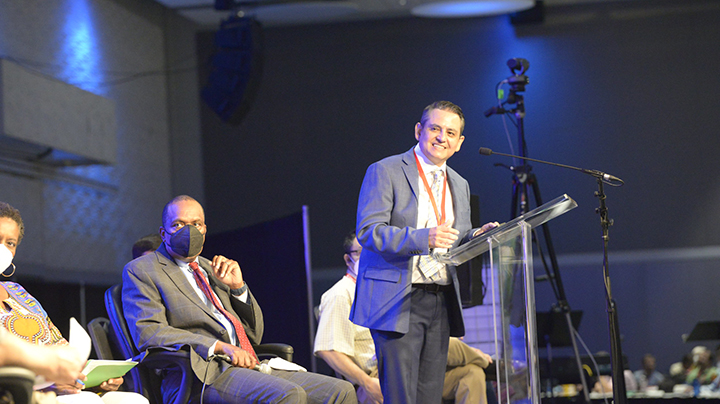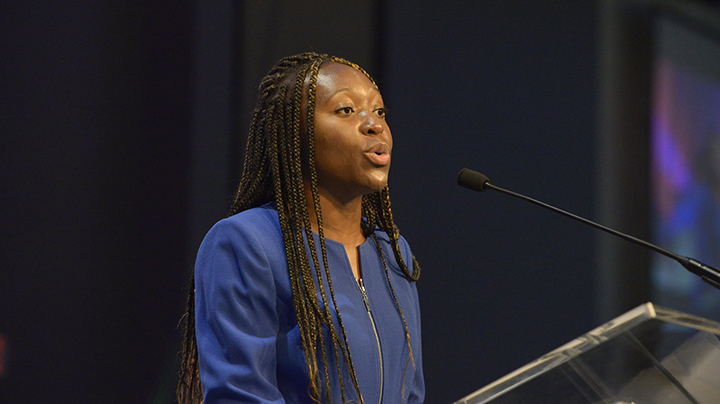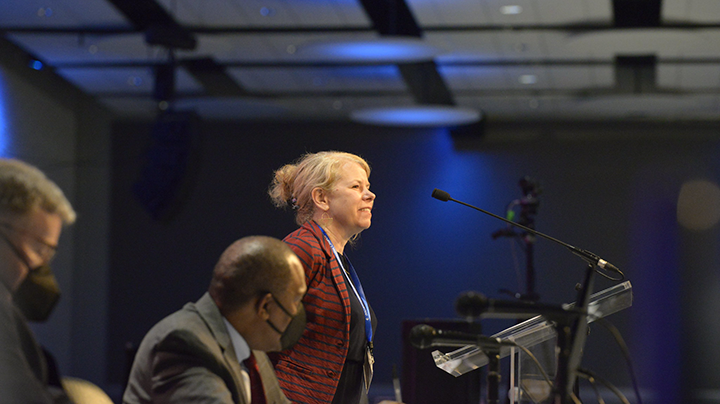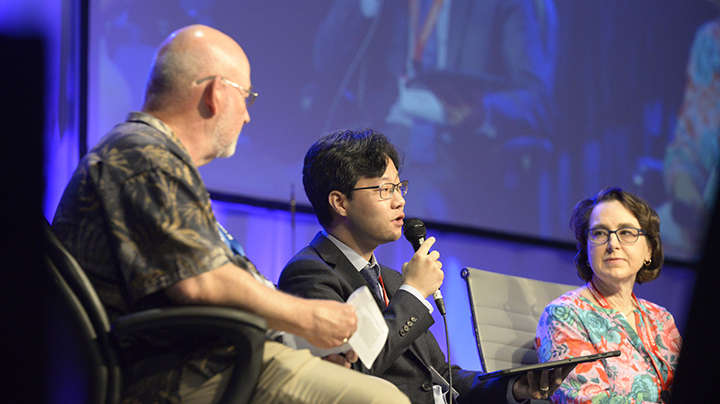Race, Equity, and Justice Ministries

Director Rev. Ernesto Barriguete shared an overview of the anti-racism work of our Conference Race, Equity, and Justice Ministries, highlighting the ways that anti-racism work is first and foremost discipleship work: loving people well and sharing the love of God with all our neighbors.
The ongoing work of increasing racial equity awareness includes offering the Intercultural Development Inventory program widely across the Conference; providing additional anti-racism training opportunities; the addition of five questions about anti-racism activities in local churches to NCC Charge Conference reports; and encouraging and supporting cross-racial and cross-cultural appointments.
Barriguete also moderated a panel that helped to explore the ministry’s anti-racism work at all levels of church life. Panelists Steve Taylor, Rev. Sunny Limm, Rev. Beth Hood, Carmella McKeller, and Bishop Fairley answered questions that the team often is asked. At the close of the panel discussion on anti-racism work, Rev. Sunny Limm shared an insight, “I just want to say that the work of being anti-racist is nothing but being an expert in loving one another. So, I want you to embrace it. It’s not a side job, it is our main job.”
Native American Ministries
Rev. Mattheue Locklear shared the work of Native American Ministries in our conference, including leadership development, reading programs, and a mission to Bolivia. He celebrated the Native American clergy and laity in the conference. These ministries are supported by the annual Native American Ministries Sunday offering taken each spring. He noted that the UMC’s work in the past and present has made a difference in the Native American community.
Hispanic-Latinx Ministries
Sara Cortes celebrated the ways that the ministry of Hispanic-Latinx Committee has grown. She shared that the committee has formed partnerships throughout our conference to support the development of leadership courses in Spanish, the certification of Lay Ministers, and the commissioning and ordination of Spanish-speaking clergy. Cortes urged those gathered to step up and intentionally open spaces, and open opportunities, and open our hearts, and let the Holy Spirit guide us in the church.
Strengthening the Black Church
Rev. Rhonda Grant Jordan shared the work in our Conference to strengthen black churches within our Conference and cultivate black leaders, laity, and clergy, for our Conference. The committee is bringing black pastors together regarding the Comprehensive Plan to help bridge gaps. Scholarships to retreats and funding for Zoom accounts are prioritized. They are also financially assisting seminary students, churches, and clergy.
Asian Ministries
Rev. Joseph Park shared the good work of Asian Ministries in the past year including a time of prayer for the people of Myanmar and packing school supplies for children in the Philippines. The team also offered virtual English tutoring for missionaries in the Philippines, and sought to develop relationships with Asian students and faculty at Duke Divinity School. The committee is interested in connecting with churches to further their work and support anti-racism efforts.
Congregations 4 Children (C4C)
Director David Rockfeller shared how churches have helped support literacy for children in the face of numerous pandemic challenges. C4C has added an emphasis on advocacy for children in public education, providing webinars and additional online resources to help churches strengthen the public schools in their communities.
Fayetteville Justice for Our Neighbors (JFON)

Donna Akuamoah, an immigration attorney with the Fayetteville Justice for Our Neighbors (JFON), shared their work to reunite separated migrant families and advocating against unjust immigration policies. JFON assisted over 200 families last year through legal assistance and advocacy. Akuamoah thanked those gathered for their financial support of this ministry.
Conference Health Team
Rev. Lindsay Ballance Collins shared the work of the Conference Health Team, including bi-monthly COVID updates, information about accessing the state’s opioid settlement resources, and addressing the mental health epidemic that has resulted from the pandemic.
Evangelism and Discipleship
After inviting Bishop Fairley to sing “Jesus Loves the Little Children” with him, Rev. Terry Williams then invited those who work with young people to mark their calendars for the “ABC’s of Diversity” virtual presentation planned for Aug. 23 on Zoom.
The stories behind this year’s Harry Denman Evangelism Awards, granted by the Foundation for Evangelism, were shared. This year’s recipients were Rev. Stephen Dunn, Farmville UMC; laity Gayle Tabor, St. Paul UMC: Carolina Beach; and lay youth Jacey Hilburn, Gardner’s UMC.
Center for Leadership Excellence (CLE)

Director Leah Wiebe-Smith shared the work of the CLE, which adapted and provided 50 online events since March 2020, with over 3,800 participants. A cohort program for small churches, called Impact, is beginning this fall. Upcoming programs also include Crisis Communications (on Zoom) and an in-person day of learning about Leading During Anxious Times. Details are available at nccumc.org/leadership.
Christian Unity and Interreligious Relations (CUIR)
Rev. Grayson Hicks Dye shared some of the work of the CUIR in our conference, including a presence at the Wild Goose Festival, an ecumenical gathering in the western part of the state, and partnering with the CLE for an in-person Christian Unity Event on Sept. 27.
Church & Society
Rev. Molly White brought greetings from the Conference Board of Church and Society. In the past year, many local congregations have developed social justice ministries to address racism, creation care, and other justice concerns. Information about available grants and award monies for this work are posted online at nccumc.org/christian-formation/church-and-society. White encouraged churches to contact the committee for information about studies and tools to help with the practice of justice in our communities.
Safe Sanctuaries
Rev. Mamie Alley offered a word of encouragement as churches continue to navigate challenging circumstances while still seeking to faithfully enact Safe Sanctuaries policies to protect children, youth, and vulnerable adults. She suggested that Safe Sanctuaries be seen as a holy habit to be practiced, not a policy to be followed. It is a tool to equip us to make disciples.
Financial Discipleship
Rev. Rick Clayton shared that the Financial Discipleship Team is available to provide inspirations and guidance and help foster a spirit of generosity in our churches. He acknowledged that financial security is a concern and declared that, “Finance is a faith matter.” The team offers Zoom consultations to help churches address congregational concerns, set goals, and brainstorm stewardship sermon series. They seek to serve as a resource to help congregations face the challenges of this time.

